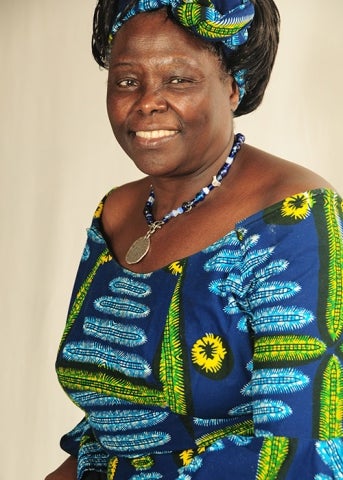Note: Yale School of the Environment (YSE) was formerly known as the Yale School of Forestry & Environmental Studies (F&ES). News articles and events posted prior to July 1, 2020 refer to the School's name at that time.
 Wangari Maathai
Wangari Maathai
But after noticing a portrait of the Nobel Laureate and former McCluskey Fellow hanging in Sage Hall, and chatting with former F&ES student Adedana Ashebir, (MEM ’13), Babalola started to realize the extent of Maathai’s advocacy for social justice and ecosystem conservation in Africa. That legacy includes the Green Belt Movement, which promoted the empowerment of women and environmental preservation through the planting of trees.
“As I studied Wangari more, I learned more about the Green Belt movement and about her role as a pioneer in the environmental movement on the continent,” says Babalola, a Nigerian citizen and co-leader of F&ES’s Africa student interest group (SIG). “Unfortunately the continent’s environmental legacy is not well documented. If someone was going to write a history of the movement, you’d have to take many moving pieces from different times in history to understand it.”
In hopes of tying some of these pieces together, Babalola helped organize “Africa’s Green Future: Nurturing the Vision of Wangari Maathai,” a two-day event being held at F&ES on Sept. 19 and 20 in Kroon Hall.
Beyond sharing Maathai’s story, the event will explore how her legacy of community-based advocacy can help shape responses to the challenges facing Africa in the 21st century, including resource management, environmental degradation, and the protection of women’s rights and land rights.
The first day will feature a screening of the documentary “Taking Root: The Vision of Wangari Maathai,” followed by a discussion with its directors, in Burke Auditorium.
The second day will include an interview with Wanjira Mathai, Wangari’s daughter and project leader for the Wangari Maathai Institute for Peace & Environmental Studies. Afterward there will be a panel discussion on a range of critical issues, followed by a pair of scenario-building workshops.
“The reason Wangari was important is that she was working on solutions from the bottom up,” said Esther Rojas-Garcia, a second-year F&ES student and one of the event coordinators. “And as we have learned, much of the ‘top-down’ work being done in Africa hasn’t worked.”
The event, which is free and open to the public, will culminate with a tree planting on Sachem’s Wood. For more information, go to facebook.com/AfricasGreenFuture.
FULL LIST OF EVENTS
Thursday, Sept. 19
6:00pm: Opening remarks by James Leitner (BA ’75), president of Falcon Management Corp.
6:30pm: Screening of “Taking Root: The Vision of Wangari Maathai,” followed by a discussion with directors Lisa Merton and Alan Dater
Friday, Sept. 20
8:30am: Registration and light breakfast
9:00am: Interview with Wanjira Mathai, daughter of Wangari Maathai and project leader for the Wangari Maathai Institute for Peace & Environmental Studies
10:00am: Panel discussion featuring Cheryl Doss, senior lecturer in economics and African studies at Yale University; Alia Kate from CorpsAfrica; Ngoni Munemo, chair of the International Studies Program at Williams College; and Amy Vedder, a conservation and ecology expert
11:00am: Scenario-Building Workshops
12:30pm: Closing remarks by F&ES Dean Peter Crane and a commemorative tree planting on Sachem’s Wood